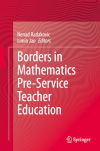- About MAA
- Membership
- MAA Publications
- Periodicals
- Blogs
- MAA Book Series
- MAA Press (an imprint of the AMS)
- MAA Notes
- MAA Reviews
- Mathematical Communication
- Information for Libraries
- Author Resources
- Advertise with MAA
- Meetings
- Competitions
- Programs
- Communities
- MAA Sections
- SIGMAA
- MAA Connect
- Students
- MAA Awards
- Awards Booklets
- Writing Awards
- Teaching Awards
- Service Awards
- Research Awards
- Lecture Awards
- Putnam Competition Individual and Team Winners
- D. E. Shaw Group AMC 8 Awards & Certificates
- Maryam Mirzakhani AMC 10 A Awards & Certificates
- Two Sigma AMC 10 B Awards & Certificates
- Jane Street AMC 12 A Awards & Certificates
- Akamai AMC 12 B Awards & Certificates
- High School Teachers
- News
You are here
Borders in Mathematics Pre-Service Teacher Education

Publisher:
Springer
Publication Date:
2020
Number of Pages:
305
Format:
Hardcover
Price:
169.99
ISBN:
978-3-030-44291-0
Category:
Collection
[Reviewed by , on ]
Duane Graysay
11/14/2021
This edited volume consists of four themed sections organized around the notion that participating in preservice teacher education, whether as a preservice teacher or as a teacher educator, involves navigating an array of borders that separate mathematical topics, that separate mathematics from other disciplines, or that separate groups of people based on various identity variables. The primary audience for this volume is the community of mathematics teacher educators and mathematics teacher education researchers. Although readers might extract implications for teacher education pedagogy from the various chapters of the volume, the primary purpose of each chapter is focused on sharing theoretical perspectives or the results of empirical research. Because of the organization of the volume, the book will be of broad appeal due to the range of perspectives offered across the four themed sections.
The themes of the Parts of the volume differ with respect to the nature of the border that the chapters in that Part address. In Part I, Sandy Crespo calls for mathematics teacher educators to engage in the difficult work of confronting problematic borders in mathematics teacher education. Crespo identifies four particular problematic borders: the divide between mathematics courses and education courses in teacher preparation, the divide that we create by categorizing learners as novices or experts, and the divide between researchers and teachers. Crespo calls for teacher educators to commit to confronting and challenging these divides in the name of a more asset-focused, collaborative, and rehumanized mathematics education.
Part II shifts the focus to borders in curriculum for mathematics pre-service teachers through several interesting chapters, each of which involve examining innovative ideas related to supporting preservice teacher learning. Part III takes up ideas related to borders within and between teacher education programs through a set of chapters, each by authors from a different nation. The chapters offer research and theoretical perspectives on the ways that preservice teachers perceive the goals and effects of components of their professional education program; how the goals of teacher exams offer insight into national and cultural influences on opportunities for preservice mathematics teachers and preservice special education teachers to develop knowledge required for their individual and collaborative work with students; the experiences of elementary preservice teachers within activities in which the preservice teachers created, completed, and assessed final examinations with each other; efforts to engage American pre-service teachers in learning Hungarian approaches to mathematics pedagogy; and a theoretical lens for examining virtual communities and the interactions between users and various platforms used for engaging in those communities.
Part IV focuses on borders between societal groups as related to pre-service mathematics teacher education, for example, by offering a theoretical perspective intended to support pre-service teachers to recognize and challenge social divisions related to gender, sexuality, and other identity categories in mathematics education. Other chapters in Part IV explore other aspects of relationships between mathematics education and social processes that create borders, such as the persistence of racialized discourses in mathematics classrooms; and a duo-ethnographic exploration of two scholars’ perspectives and attitudes toward standardization.
The multiple perspectives, paradigms, and issues addressed across the chapters of this book will make it a useful addition to the libraries of scholars whose teaching or research involves mathematics pre-service teacher education.
Dr. Duane Graysay is an Assistant Professor of Mathematics Education at Syracuse University. Dr. Graysay teaches methods courses for secondary pre-service mathematics teachers and undergraduate mathematics courses for majors and non-majors. His research includes examining effective pedagogies for secondary mathematics pre-service teachers, particularly the use of rehearsals and simulations to engage secondary mathematics pre-service teachers in eliciting and using evidence of student thinking.
See the publisher's website.
- Log in to post comments




